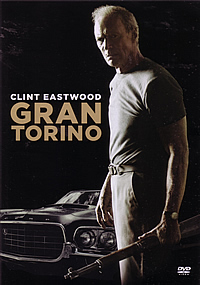SYNOPSIS:
Korean Wat vet and retired autoworker Walt Kowalski doesn't
much like how his life or his neighborhood has turned out. He
especially doesn't like the people next door, Hmong immigrants
from Southeast Asia. But events force Walt to defend those neighbors
against a local gang that feeds on violence and fear. For the
first time since Million Dollar Baby, Clint Eastwoord works
on both sides of the camera, winning the National Board of Review
Award as Best Actor for his bone-deep playing of Kowalski, burnished
with experience, grace and gravitas into a "prime vintage Eastwood
performance" (Peter Travers, Rolling Stone).
MOVIE REVIEW:
Ever notice how you come across somebody once in a while you
shouldn't have fucked with? That's me - Walt Kowalski
Featuring zilch mega stars (other than himself)
but with a worldwide box-office gross of over US$200 million,
Gran Torino in a way is a far cry from Eastwood’s recent
directorial projects. Unlike Mystic River or Letters from
Iwo Jima, the premise of Gran Torino at first glance will
not arouse much interest from the casual movie-goer, surprisingly
this is where hidden gems lie.
The Hollywood legend plays Walt Kowalski,
a retired autoworker who recently lost his wife. The opening
scenes paint Walt as a grouchy elderly, not one to mess with
and certainly not one you can be close to easily not even
the young Father from his church let alone his obnoxious sons
and grandchildren. What’s left in the old man’s
life is his faithful dog as companion and his beloved 1972
Ford Gran Torino.
The
life of this Korean War veteran changes when his Hmong neighbours
whom he initially detests (due to the conflicts he experienced
in the Korean War) starts to receive threats from gang members.
Walt armed with his reliable rifle decides to take things
in his own hands and in turn, embark on an unforeseen journey
with his young neighbour, Thao.
Through
the eyes of Walt Kowalski, this 116 minutes movie covers contemporary
issues such as racism, aging and mutual tolerance. It’s
overall engaging, sometimes comical and occasionally disturbing
as Walt gets to know more about his Hmong neighbours - Thao,
his feisty elder sister, Sue and the rest of their relatives.
He tries their food, mingles in their culture and acts as
a mentor to the shy Thao. The man who grunts and snarls earlier
even got Thao a job at a construction site and to the extend
of volunteering to lend his Gran Torino to Thao so he can
invite his date, in his own words "man him up".
As per Eastwood’s usual productions, the movie takes
it’s time to develop. We see how Walt deal with all
the stereotypes, mouth a generous amount of coarse language
and did a whole lot of mundane stuff like visiting his regular
barber or a pretentious visit by his son on his birthday.
Conventional plot points as mentioned that keep things going
before the face off with the gang. You keep thinking how on
earth this old man is going to deal with the thorny issue
on hand?
But Clint Eastwood will be forever been associated
with his screen icon, Dirty Harry as the man despite the ripe
old age of 79 still proves he can handle the tough guys. There’s
no need for Walt to fire any gun shots here and yes, you are
convinced the old man can literally still blow a hole in your
face or stack you like sandbags when you are dead.
Technically
speaking, Eastwood’s deployment of old-school film techniques
works remarkably well in Gran Torino. There isn’t any
fancy cinematography or visual quick cuts to speak of yet
subtly reflect the believability of Walt Kowalski as a character.
In his supposedly swansong in front of the camera, Eastwood
puts in a stoic performance together with his reliable supporting
cast and deliver a current statement on America’s social
sentiments. And this Nick Schenk's scribed story actually
helps make a gracious exit for Clint Eastwood as an actor
and also his onscreen character.
By
the time the credits start rolling with Eastwood’s husky
rendition of his own composition, you will forever likely
remember the image of Walt Kowalski sitting on his porch,
one beer in his hand admiring his 1972 Gran Torino.
SPECIAL FEATURES :
Manning the Wheel: the Meaning of Manhood as Reflected in
American Car Culture – A ten minutes promotional
featurette that talks more about man’s obsession with
automobiles than the movie itself.
Gran
Torino: More Than a Car – Crew members talk
about searching the Gran Torino for the movie in this short
four minutes feature.
AUDIO/VISUAL:
The DVD transfer on the whole looks grainy especially from
such a recent release though the black tones look much better.
There’s isn’t much opportunity for the Dolby Digital
to shine in this dialogue driven movie except for some occasional
ambient sound effects.
MOVIE RATING:
   
DVD
RATING :
 
Review
by Linus Tee
Posted on 25 August 2009
|


